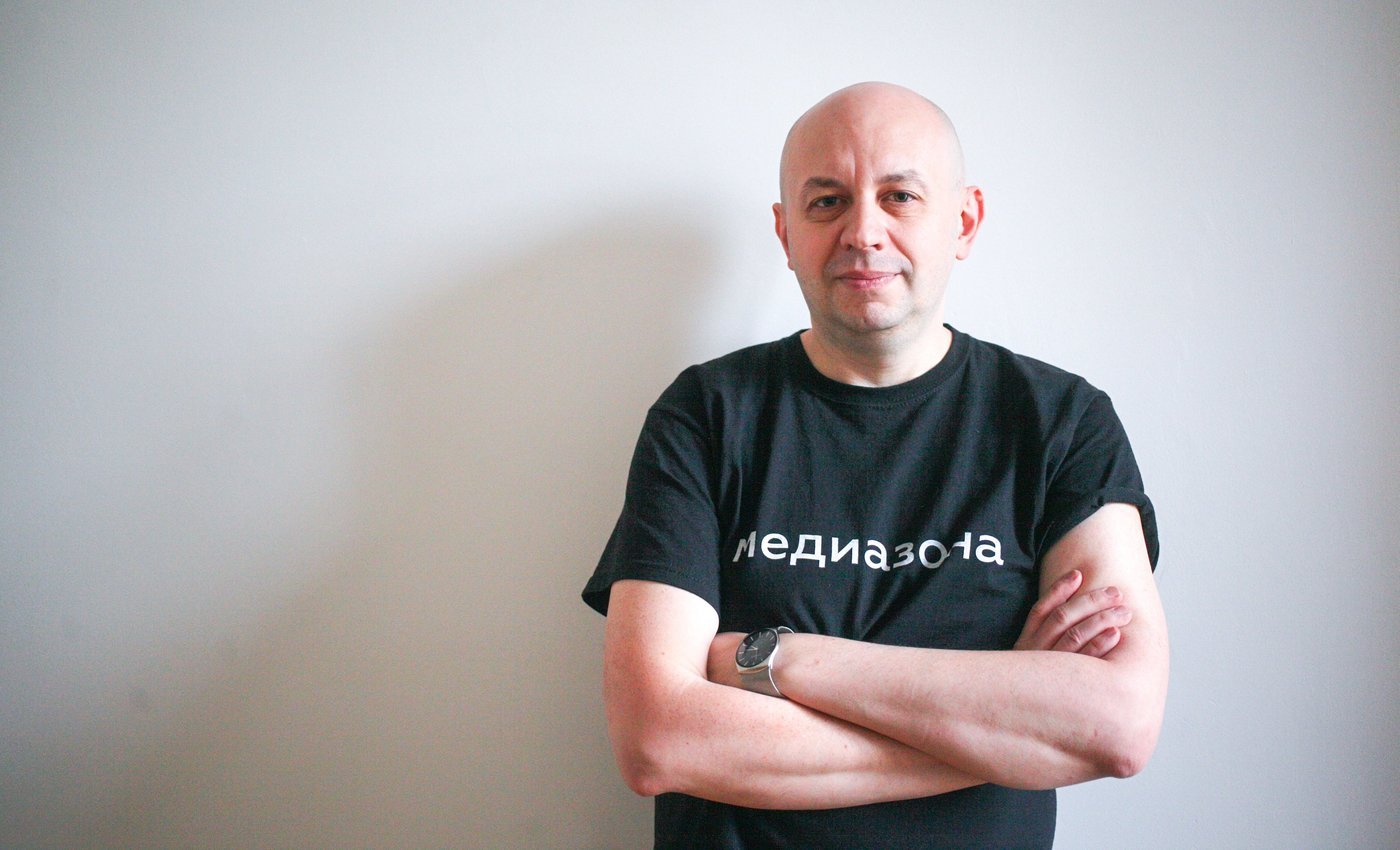For our October feature in “Portraits of FoE Defenders,” Sergey Smirnov, Editor-in-Chief of Mediazona, a leading independent Russian media outlet, tells CGFoE’s Editor Anastasiia Vorozhtsova of Russia’s political repressions and eradication of independent journalism, his criminal case, and Mediazona’s bare survival in exile.
Sergey Smirnov has been the editor-in-chief of Mediazona since its founding in 2014 by Pussy Riot members Nadezhda Tolokonnikova and Maria Alyokhina. Mediazona covers Russia’s criminal justice system, political trials, and war. Shortly after Russia launched its full-scale invasion of Ukraine in 2022, the outlet’s website was blocked, and new restrictive laws put independent reporters at risk of criminal prosecution. As a result, Mediazona’s team left Russia and is currently working in exile. Before joining Mediazona, Smirnov served as deputy editor-in-chief at Russkaya Planeta and as a political correspondent at Gazeta.ru.
The interview has been translated from Russian and edited for length and clarity.

Sergey Smirnov is the editor-in-chief of Mediazona, a prominent exiled Russian media outlet covering Russia’s criminal justice system, political trials, and the invasion of Ukraine. Photo credit: Mediazona
Anastasiia Vorozhtsova: What is the current scale of political prosecution in Russia? What do we know and don’t know?
Sergey Smirnov: We are quite familiar with the classic charges in politically motivated cases. They are “disseminating fakes,” “discrediting the army,” and violating the “foreign agents” laws. “Justification of terrorism” has also undoubtedly become one of the main political charges. We know quite a lot about these cases. Yet other categories have emerged since the full-scale war began that are not so easy to assess at the moment.
For example, the number of “state treason” cases has increased sharply. Normally, these cases are not considered purely politically motivated, but based on what’s happening in Russia, we will probably have to classify them as political. The problem is, we know nothing about many of them because “state treason” trials are usually closed.
Treason is interpreted broadly in Russia and includes donations to Ukraine. There are a huge number of such cases and several high-profile ones, like the case of Ksenia Karelina, an American, who, upon her arrival in Russia, was charged with treason for a $50 donation. [Karelina had donated the money to a US-based charity supporting Ukraine; she was sentenced to 12 years in prison in 2024; she was released as part of a prisoner swap in spring 2025.]
Another not-easy-to-assess category concerns terrorism-related charges: not “justification of terrorism,” which is obviously becoming a political charge, but direct “participation in a terrorist organization” or “participation in a terrorist community.” People often face these charges in completely opaque cases, but we see that it’s a conveyor belt. Many cases are related to attempts to join the Freedom of Russia Legion or the Russian Volunteer Corps [paramilitary units of Russian citizens fighting on behalf of Ukraine].
Several such cases appear to be provocations by the security forces, leading us to assume that a significant portion of them, if not the majority, could be provocations. Let’s say security agents pose as volunteers for the paramilitary units, looking for people, luring them in, conducting “operational activities,” as they say in their own language, and eventually sending the case to court. Should these cases be considered political? I think they should.
The same is with the “sabotage” charge: say, an undercover security agent offers 10-15,000 rubles for you to set some relay cabinet on fire, and here you go. [Arson attacks targeting relay cabinets near railway tracks occur often in Russia.] They’re targeting young people, often from poor families. Once the case is filed, huge sentences are handed out. Nothing suggests that this isn’t political.
As for the scale, it’s difficult to talk about political prosecution in a vacuum. We have to draw comparisons. If we look at, for example, how things were fifteen years ago, the scale of political repressions today is simply enormous. If we compare it with Stalin’s time, then it’s certainly incomparable. I’d say, though, that today’s scale of political prosecution seems to be on a par with the Brezhnev era and probably already exceeds it. But direct analogies are hard to draw.
In Novaya Gazeta and Others v. Russia, the ECtHR noted a state-sponsored campaign to silence criticism of Russia’s war in Ukraine. That campaign continues. What new patterns of cases are emerging?
The systemic suppression of criticism has been in place since 2022, I think. I can’t say it’s changed much or been modernized in any way because any criticism has been prohibited since then, and what we’re seeing now is a continuation of what was already introduced before. “Disseminating fake news” and “discrediting the army” cases continue, and I wouldn’t point to any new patterns right now. All the necessary laws have been passed, and they’re simply being tightened and clarified. In fact, a whole series of laws has been made more restrictive.
To add to my first answer, legislation is being tightened not only with regard to government critics and political prosecution, but also in response to Russia’s current needs. For example, one of the most popular criminal cases right now is unauthorized absence from military service for military personnel. How is that a political case? Unclear. Most of them are purely mundane.
Is any independent journalism still possible in Russia?
I think it’s simply impossible to work fully—with an office, under your own name—within Russia right now. You can get information from inside the country, but a truly independent media outlet can’t operate in Russia today, no matter what anyone says. Or you can operate, but you will face very serious restrictions and control the information you publish. I don’t see any way to work within the country and write whatever you want to write.
You’ve been placed on the wanted list in Russia. Can you tell us a little about the criminal case against you? We’ve previously covered “foreign agent” cases, so our audience is somewhat familiar with them.
I was placed on the wanted list for four posts in a Telegram channel, in which I didn’t include that banner. [Russia’s “foreign agent” legislation requires those designated as such to label any materials they publish with the “foreign agent” notice, commonly referred to as the “banner”; both Mediazona and Smirnov himself were designated as “foreign agents” in 2021.] That’s all. There’s nothing more to say about the criminal case. My God, I have a criminal case that’s a page and a half long! It’s so ridiculous: I am being accused of not complying with the laws on “foreign agents” by posting “incorrectly” on social media. For that, I’m wanted.
This past spring, Mediazona was on the brink of survival and launched an emergency funding campaign. You and editor Dmitry Treshchanin announced that you both would be working without pay. What is the current situation for Mediazona? And where do you personally find the strength to continue?
Look, first of all, we have restored salaries. Not completely, but we were able to restore a large portion of salaries, especially to the staff. Mediazona’s current situation is as follows: we’re in a kind of minimal survival mode.
Our rough estimate was that 5,000 paid subscribers would ensure our bare survival, at least for this year. We’re at that level now, with a bit more than 5,000 subscribers, but it’s pretty hard to talk about a full-fledged existence, development, or even next year. We’re just surviving as best we can. But, for 2025, a survival mode is already pretty good, so it would be a shame to complain. Sorry, I can’t put it any other way.
Where do I get the strength to keep working? The question is a tough one to answer honestly. I don’t even know and don’t want to make anything up, lie, or spout some fancy words. I just think we’re doing some important, necessary work, and we shouldn’t stop. I guess that’s all. I don’t know what else to say. We have to. We have to do it. We see that people read us and that we’re the most cited independent Russian media outlet. It is also the support we received when we announced the emergency fundraiser, along with the support of those who donate to us and read us, that helps us keep going.
Things don’t look very optimistic, both regarding our financial circumstances and, even more so, the political situation in Russia. There’s no end in sight for the war and no end in sight for Putin’s regime. The repressions will undoubtedly continue, and there’s every risk to assume they’ll escalate. Someone needs to cover all that. We hope it is us.

